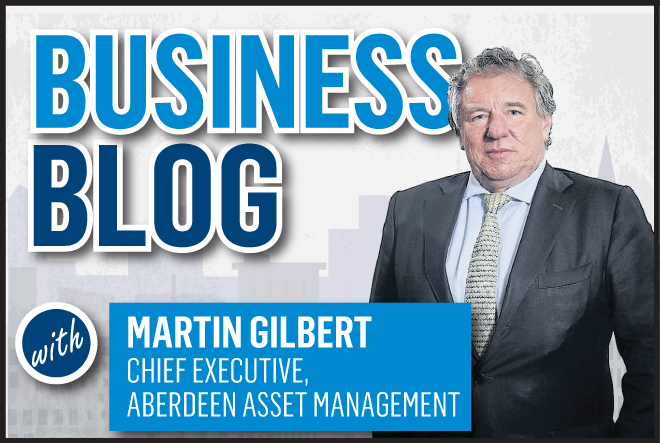Market turmoil is a natural cyclical phenomenon, as everybody who has been engaged with the financial services industry for any length of time knows. It’s like sailing, where conditions vary from flat calm to severe storm.
A good skipper will have made provision for difficult conditions so that he weathers a storm skilfully and safely. That’s what a CEO has to do when markets turn turbulent.
I’ve often said the closest analogy with the demands of business leadership is to be found in the world of sport. This view was reinforced last St Andrew’s Day, when I attended a lunch hosted by London Scottish rugby club.
I was honoured to receive one of the awards announced at the lunch – for Outstanding Achievement. It’s always gratifying when Aberdeen Asset is given recognition and I’m proud of what our team has achieved, although we are more focused on future achievements than on the past.
Winning awards feels good, but it’s the journey that matters, and this was brought home forcibly to me at the London Scottish event. I felt humble in the company of one of the other award winners. David Smith, MBE, from Aviemore, is the London 2012 Gold Medal Winning Paralympian and Double World Champion. He received the award for Outstanding Young Talent.
David’s story is an example of incredible courage in the face of exceptional adversity. Despite being born with a club foot, he grew up to become a black belt in karate and a member of the GB bobsleigh team until serious health problems forced him to transfer to Paralympic sports. He won a gold medal for rowing at London 2012.
He has twice had dangerous operations for a tumour in his spinal cord and was paralysed temporarily. Last year, the tumour grew again and he needs surgery for the third time, although he is trying to defer it, despite the risk of paralysis or death, in the hope of qualifying as a competitive cyclist for this year’s Rio Paralympics.
A fraction of the problems David has confronted would have driven most human beings to despair. But his spirit is indomitable. He describes his philosophy in striking terms: “In life, we are defined by what we do at our lowest, and in the dark places we find ourselves. It is in these places that the only thing that can defeat you is you.”
I wouldn’t for a moment compare the difficulties faced by even the most beleaguered CEO of a struggling organisation to the life-or-death battle fought over years by David Smith. But the qualities that have enabled him to hold his own against overwhelming odds are also indispensable to business leaders.
The qualities a leader needs in the business world are the same as in all other challenging walks of life: courage, intelligence (emotional as well as intellectual, to command the confidence of colleagues), experience, imagination and tenacity. Those are the necessary qualifications for success in difficult times.
All businesses go through peaks and troughs, as we’re witnessing currently in the oil industry. Business leaders should be judged by their response when things aren’t going well, not when they have it easy.
But difficult markets require leaders to inspire not just their board colleagues and employees; they have to take shareholders and investors with them, too, helping them to recognise real wealth creation is about achieving long-term goals, rather than short-term gains.
Recently, Larry Fink, CEO at BlackRock, the world’s biggest investor with $4.6trillion, sent a letter to the chief executives of the S&P 500 companies and large European corporations, warning of the damaging effects of short-termism, both in the corporate world and in politics.
In his letter, Larry Fink said that, despite much corporate lip-service to long-termism, “many companies continue to engage in practices that may undermine their ability to invest for the future”. He wants companies to educate investors “about the ecosystems they are operating in, what their competitive threats are and how technology and other innovations are impacting their businesses”.
His most strongly worded warning is: “Today’s culture of quarterly earnings hysteria is totally contrary to the long-term approach we need.” Exactly right. And that warning also applies to periods longer than a financial quarter. It’s understandable that investors should become nervous in turbulent markets, but they need to be persuaded that steering a firm course will bring rewards, rather than bobbing around directionless in a confusion of cross-currents.
No one ever said running a business would be easy and things always improve over time. What I have learned in a career straddling four decades is to stay patient and regard difficult conditions as an opportunity to test my skills as a leader. Most importantly, to keep focused on the long-term rewards that await those with staying power.
